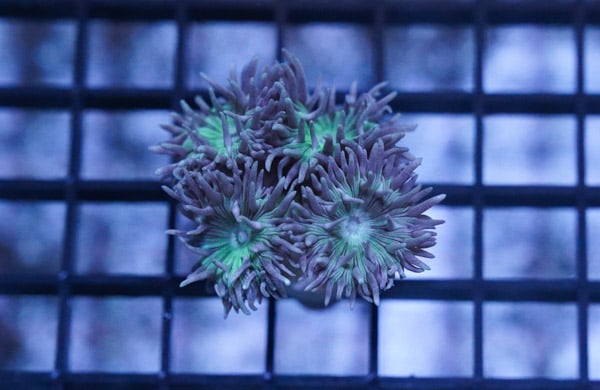Duncan Coral: Green – Australia (Duncanopsammia axifuga)
Quick Stats:
- Care Level: Moderate
- Temperament: Peaceful
- Diet: Photosynthetic and Filter Feeder
- Reef Safe: Yes
- Minimum Tank Size: 30 gallons
- Nature Max Size: 4-6 inches
- Water Parameters: Salinity 1.023-1.025, pH 8.1-8.4, Temperature 72-78°F
Duncan Coral: Green – Australia (Duncanopsammia axifuga)
The Duncan Coral, also known as Duncanopsammia axifuga or Whisker Coral, is a popular choice for saltwater aquarium enthusiasts. This comprehensive guide will provide you with all the essential information you need to know about keeping the Duncan Coral in your saltwater aquarium.
Habitat
The Duncan Coral is native to the warm waters of Australia, particularly the Great Barrier Reef. It is commonly found in shallow reef environments with moderate water flow.
Size
The Duncan Coral can grow up to 4-6 inches in size, with its polyps extending outwards in multiple directions.
Temperament
The Duncan Coral is considered peaceful and can coexist with a variety of fish, invertebrates, and corals. It may show aggression towards other corals if they encroach on its space.
Diet in Aquariums
The Duncan Coral is both photosynthetic and a filter feeder. It obtains energy through photosynthesis from its symbiotic algae, but it also extends its tentacles to capture small planktonic organisms from the water column.
Water Flow Recommendation
It is recommended to provide moderate water flow in the aquarium to simulate its natural habitat. This can be achieved by using powerheads or wavemakers strategically placed in the tank.
Lighting Recommendation
The Duncan Coral requires moderate to high lighting in the aquarium. T5 fluorescent bulbs or LED lights with a color temperature between 10,000K and 20,000K are suitable for its growth and coloration.
Aquarium Placement Recommendation
The Duncan Coral should be placed in the mid to lower regions of the aquarium, where it can receive adequate lighting and moderate water flow. It is important to leave enough space between the Duncan Coral and other corals to prevent any aggressive interactions.
Aquacultured Availability
The Duncan Coral is commonly available as aquacultured specimens. This means that they are propagated in controlled environments, which helps reduce the impact on wild populations and ensures healthier and more sustainable specimens for the aquarium trade.
Compatibility with Other Tankmates
The Duncan Coral is generally compatible with a wide range of fish, invertebrates, and corals. Here are five specific tankmates that can be good choices:
- Clownfish – Clownfish and Duncan Coral have a symbiotic relationship, with the coral providing shelter and the clownfish providing nutrients through its waste.
- Firefish – Firefish are peaceful and will not bother the Duncan Coral. They add movement and color to the aquarium.
- Cleaner Shrimp – Cleaner Shrimp help keep the Duncan Coral free from parasites and provide an interesting interaction in the tank.
- Zoanthids – Zoanthids and Duncan Coral can be placed close to each other, creating a visually appealing contrast in colors and textures.
- Green Star Polyps – Green Star Polyps and Duncan Coral can coexist, as long as they are given enough space to expand without competing for territory.
Other Common Names
The Duncan Coral is sometimes referred to as the Whisker Coral due to the appearance of its polyps extending outward like whiskers.
Why Buy from Reefs4Less.com?
Reefs4Less.com is a reputable online retailer specializing in saltwater aquarium supplies. Here are a few reasons why you should consider purchasing from them:
- Wide Selection: Reefs4Less.com offers a wide range of corals, fish, and other aquarium supplies to cater to the needs of every saltwater aquarium enthusiast.
- Quality Assurance: They ensure that all their livestock is healthy, properly quarantined, and accurately identified to provide a positive experience for their customers.
- Expert Advice: Reefs4Less.com has a team of knowledgeable staff who can provide guidance and support to help you make informed decisions for your saltwater aquarium.
- Convenience: Shopping online at Reefs4Less.com allows you to conveniently browse their selection, compare prices, and have your purchases delivered right to your doorstep.
- Sustainability: Reefs4Less.com supports sustainable practices by offering aquacultured and responsibly sourced specimens, helping to conserve wild populations and protect the fragile marine ecosystems.
Popular Questions and Answers
1. Can the Duncan Coral tolerate high water flow?
While the Duncan Coral prefers moderate water flow, it can tolerate higher flow rates as long as it is acclimated gradually. Too much water flow may cause the coral’s polyps to retract, affecting its overall health.
2. How often should I feed the Duncan Coral?
The Duncan Coral primarily relies on photosynthesis for energy, but it can be supplemented with small meaty foods like brine shrimp or reef plankton. Feed it once or twice a week, ensuring that the food is small enough for the polyps to capture.
3. Can the Duncan Coral sting other corals?
The Duncan Coral possesses sweeper tentacles that can extend to sting nearby corals if they encroach on its space. It is important to provide sufficient spacing between corals to avoid any aggressive interactions.
4. Can the Duncan Coral be fragged?
Yes, the Duncan Coral can be fragged by carefully cutting a portion of its branches and attaching them to a frag plug or live rock. Ensure proper handling and use sterilized tools to minimize stress and the risk of infection.
5. How fast does the Duncan Coral grow?
The growth rate of the Duncan Coral can vary depending on environmental conditions and feeding. Under optimal conditions, it can grow approximately 1-2 inches per year.


Reviews
There are no reviews yet.